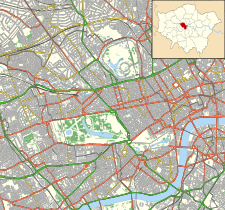Hospital in London, England
| Royal London Hospital for Integrated Medicine | |
|---|---|
| University College London Hospitals NHS Foundation Trust | |
 Royal London Homoeopathic Hospital in Great Ormond Street in 2009 Royal London Homoeopathic Hospital in Great Ormond Street in 2009 | |
 | |
| Geography | |
| Location | London, WC1, United Kingdom |
| Coordinates | 51°31′18″N 0°07′17″W / 51.5217°N 0.1215°W / 51.5217; -0.1215 |
| Organisation | |
| Care system | NHS |
| Affiliated university | University College London |
| Services | |
| Beds | None |
| Links | |
| Website | University College London Hospitals NHS Foundation Trust |
The Royal London Hospital for Integrated Medicine (formerly the Royal London Homoeopathic Hospital) is a specialist alternative medicine hospital located in London, England and a part of University College London Hospitals NHS Foundation Trust. It is the largest public sector provider of complementary medicine in Europe. It is based in the Bloomsbury area of Central London, adjacent to Great Ormond Street Hospital.
History
The London Homoeopathic Hospital was established in Golden Square, Soho, in 1849. Frederic Hervey Foster Quin, the first homeopathic physician in England, had been instrumental in the founding of the hospital. It moved to its present site in Great Ormond Street in 1859, the year when Quin took the chair of therapeutics and materia medica in the medical school. The hospital joined the NHS as a teaching hospital becoming the Royal London Homeopathic Hospital by permission of King George VI in 1948. It was brought under the management of the Bloomsbury Health Authority in 1982 and it joined University College London Hospitals NHS Trust (now University College London Hospitals NHS Foundation Trust) in 2002. The hospital was renamed the Royal London Hospital for Integrated Medicine in September 2010 to better reflect its activities.
It stopped providing NHS-funded homeopathic remedies in April 2018.
In 2024, King Charles III became patron of the hospital, a role Queen Elizabeth II had filled until her death in 2022.
Services
The Royal London Hospital for Integrated Medicine offers clinical services including complementary cancer treatments, allergy services, acupuncture, rheumatology, weight loss management, sleep management, musculoskeletal medicine, and stress management. It has an education department which offers full and part-time courses in complementary medicine for registered health professionals. It is also home to a specialist library for complementary and alternative medicine.
See also
References
- ^ "Royal London Hospital for Integrated Medicine guide" (PDF). University College London Hospitals NHS Foundation Trust. Archived from the original (PDF) on 11 November 2010. Retrieved 17 September 2010.
- ^ "Royal London Hospital for Integrated Medicine". University College London Hospitals NHS Foundation Trust. Retrieved 17 September 2010.
- ^ "UCLH trust chronology". University College London Hospitals NHS Foundation Trust. Archived from the original on 11 April 2009. Retrieved 17 September 2010.
- ^ Boase, George Clement (1896). "Quin, Frederic Hervey Foster" . In Lee, Sidney (ed.). Dictionary of National Biography. Vol. 47. London: Smith, Elder & Co.
Chiefly through his exertions the London Homeopathic Hospital was founded in 1850
- "Hospital drops 'homeopathy' title". The Press Association. 16 September 2010. Retrieved 17 September 2010.
- "NHS homeopathy ending in London". BBC News. 13 March 2018. Retrieved 11 May 2018.
- "His Majesty King Charles III accepts patronages of University College Hospital and the Royal London Hospital for Integrated Medicine". UCLH NHS Foundation Trust. Retrieved 2 June 2024.
External links
| University College London | |||||||||||||
|---|---|---|---|---|---|---|---|---|---|---|---|---|---|
| |||||||||||||
| |||||||||||||
| |||||||||||||